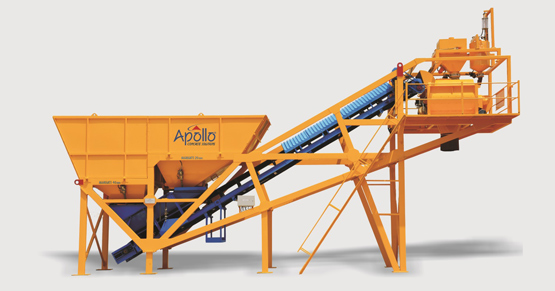Table of Contents
Large construction projects demand a continuous and reliable supply of high-quality concrete. From highways and bridges to large-scale building developments, these projects benefit significantly from the convenience and efficiency of mobile concrete batching plants. Unlike stationary plants, mobile concrete batching plants provide concrete solutions directly at the construction site, reducing transportation costs, time, and dependency on external suppliers. In this article, we’ll explore why mobile concrete batching plants are ideal for large-scale construction projects, particularly in terms of design, flexibility, and capacity.
Benefits of Mobile Concrete Batching Plants for Large Projects
1. On-Site Production and Immediate Availability
- Minimized Transportation Needs: Mobile concrete batching plants allow contractors to produce concrete right at the site, removing the logistical challenges of transporting large volumes of concrete from remote plants. This is especially beneficial for projects in remote or congested areas where timely concrete delivery may be difficult.
- Continuous Supply of Concrete: Large projects typically need consistent concrete batch solutions to avoid delays. Mobile plants are highly effective in addressing these needs by ensuring a steady, on-demand supply of fresh concrete, which is crucial for maintaining the project schedule.
2. High Capacity to Meet Large-Scale Demands
- Tailored to Project Requirements: Mobile concrete batching plants come in a variety of capacities, ranging from small units that produce 20–50 cubic meters per hour to high-capacity models capable of producing 100+ cubic meters per hour. This range allows contractors to select a plant that best matches the project’s daily concrete volume needs.
- Meeting Project Scale: For example, a highway construction project that requires large amounts of concrete each day would benefit from a high-capacity mobile batching and mixing plant, reducing downtime and ensuring that concrete production aligns with the project’s scale and pace.

3. Flexibility and Quick Setup
- Rapid Installation: One of the standout advantages of mobile concrete batching plant design is the quick setup time. Unlike stationary plants that require extensive groundwork, mobile plants are designed for fast assembly, allowing for near-immediate concrete production after arriving on-site.
- Adaptable to Changing Locations: Some large projects, such as railways or highways, may stretch across multiple sites. Mobile concrete batching plants can easily move along with the project as it progresses, making them ideal for projects that require flexibility and adaptability.
4. Enhanced Control and Customization
- Precise Mixing Capabilities: Mobile concrete batching plants often include advanced controls that enable precise adjustments to the concrete mix, allowing contractors to tailor the composition based on specific project requirements. For instance, different sections of a project may require different concrete strengths, which mobile plants can adjust in real-time.
- Customizable Capacity and Design: Mobile concrete batching plant manufacturers offer customization options, allowing buyers to select features such as additional silos, larger mixing drums, or advanced digital control systems to enhance the batching process according to project demands.
Capacity Considerations for Mobile Concrete Batching Plants
Selecting the right concrete batching plant capacity is essential for large projects. An undersized plant may cause project delays due to insufficient concrete production, while an oversized plant could lead to unnecessary costs and wasted resources.
1. Concrete Volume Requirements
- Calculating Daily Needs: Calculate the concrete volume required per day based on the project size and timelines. For example, a high-rise construction project typically requires large volumes of concrete for structural integrity, which would necessitate a high-capacity mobile concrete batching plant to meet daily demand.
- Avoiding Overcapacity: Choosing an excessively large concrete batch plant can lead to inefficiency, as smaller projects may not utilize the plant’s full potential, increasing operational costs. Assess the project’s maximum concrete needs to find a suitable capacity range.
2. Project Duration and Frequency of Use
- Long-Term Projects: For projects expected to run for several months or even years, investing in a high-capacity concrete batching and mixing plant that can handle large volumes efficiently makes sense.
- Intermittent Concrete Needs: Projects that don’t require continuous concrete production may benefit from a smaller, more compact batching plant. This is often seen in projects where concrete needs fluctuate, and a smaller mobile plant can be deployed when required, conserving resources.
3. Concrete Quality Consistency
- Enhanced Quality Control: Mobile concrete batching machines allow contractors to maintain greater control over concrete quality, as mixing can be supervised on-site. With features like automated weighing systems and computerized controls, these machines ensure a consistent and high-quality concrete mix throughout the project.
- Reducing Waste and Enhancing Efficiency: On-site production reduces waste, as concrete batches can be adjusted and tailored as needed. This control is crucial for large projects requiring precision and high standards in structural integrity, such as bridges and skyscrapers.
Conclusion
Mobile concrete batching plants have transformed the way large projects meet their concrete needs. Their high capacity, flexibility, and on-site production capabilities make them invaluable for projects demanding reliable, efficient, and high-volume concrete supply. When choosing a mobile batching plant, consider factors such as capacity, project size, and frequency of use to ensure that the plant aligns with the project’s specific needs.
Whether for a large infrastructure project, a series of residential buildings, or a complex bridge construction, mobile concrete batching plants provide a seamless solution for delivering consistent, high-quality concrete exactly when and where it’s needed.
Table of Contents
